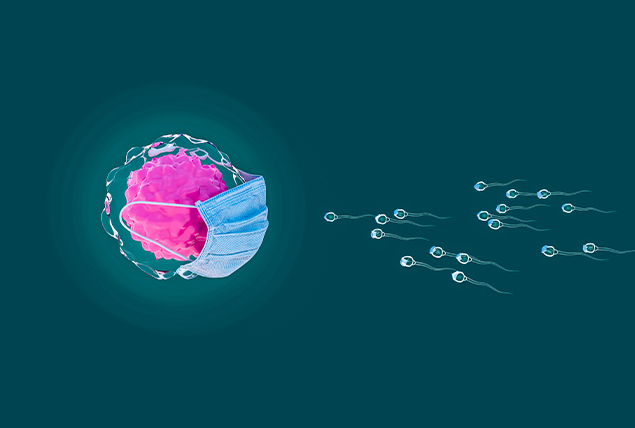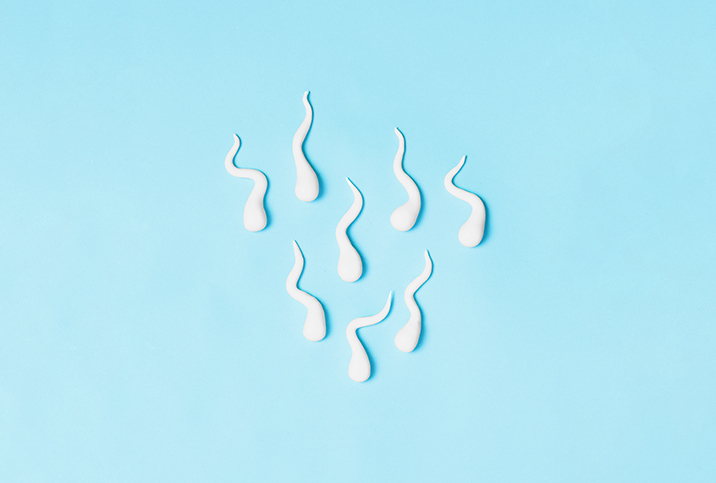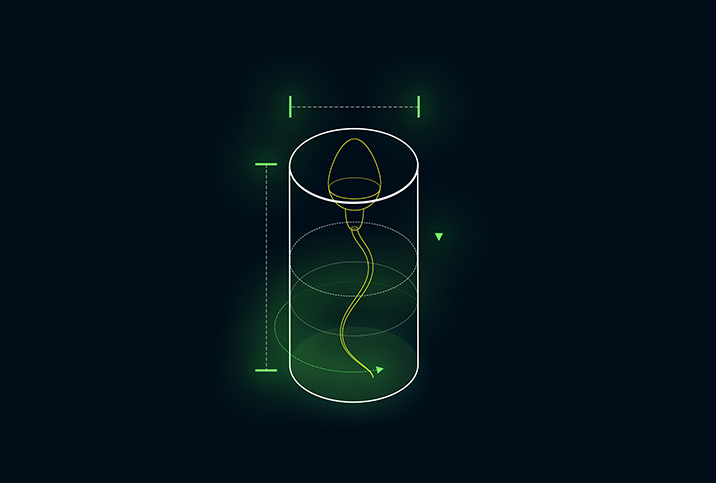COVID-19 and Infertility: The Virus's Impact on Long-term Sperm Health

The COVID-19 pandemic uprooted many systems and turned lives upside down to such a degree that we're still picking up the pieces. There's still much we don't understand about how the virus can affect our health.
Long COVID, the name given to a broad set of symptoms that can occur months or years later in infected people remains a mystery. However, research keeps finding evidence that suggests it is a very real and potentially devastating condition—one the medical community is just beginning to grapple with.
It's been suspected symptoms such as brain fog, fatigue, breathing difficulty, loss of sense of taste and/or smell, poor cognition, and other symptoms can persist long after the acute phase of the virus has passed.
Now, a Madrid-based study suggests that even the health of men's sperm may be affected months after recovering from a COVID infection—or longer.
We'll look at the study, get some input from urologists who are on the front lines and discuss how men can best protect their sperm health in general.
What is long COVID?
COVID-19, or SARS-CoV-2, is one of the most studied and examined viruses ever. The rapidity with which vaccines were developed to combat it is, by itself, a significant medical achievement. Yet, even given how much has been learned, much more remains unknown.
Despite early skepticism, a consensus is forming around long COVID: A certain percentage of people who recover from the initial infection will continue to experience symptoms months or years later. It may affect up to 20 percent of people who recover from the virus, according to the Centers for Disease Control and Prevention (CDC).
Research keeps finding evidence that suggests long COVID is a very real and potentially devastating condition.
"Long COVID refers to a condition where individuals continue to experience lingering symptoms and health issues long after recovering from the acute phase of COVID-19," said Amy Pearlman, M.D., a men's health specialist and co-founder of Prime Institute in Fort Lauderdale, Florida. "Reported symptoms include persistent fatigue, brain fog, and/or shortness of breath, each of which may affect a person's quality of life and ability to function as they did prior to their infection."
What does the study say about COVID and infertility?
Long-term impaired semen quality may be a possible symptom. That's according to the results of an international study conducted by researchers in Madrid, the findings of which were presented at the European Society of Human Reproduction and Embryology (ESHRE) annual meeting in Denmark on June 26, 2023.
The research suggests that more than three months after men had recovered from mild cases of COVID-19, they had significantly worse semen parameters than their counterparts who had never been infected. Among the most profoundly affected semen parameters were sperm concentration and sperm motility—sperm's ability to swim.
This was at least 100 days after the men recovered. That is significant since it takes about 70 to 78 days to produce new sperm. This means the sperm tested had been produced completely outside the acute period of infection.
'It may be the case that COVID has caused permanent damage, even in men who suffered only a mild infection.'
The findings were presented at the annual ESHRE event by Professor Rocio Núñez-Calonge, a Madrid-based reproduction specialist and science advisor with the UR International Group at the Scientific Reproduction Unit.
"There have been previous studies that show semen quality is affected in the short term following a COVID infection but, as far as we are aware, none that have followed men for a longer period of time," she said in a press release. "We assumed that semen quality would improve once new sperm were being generated, but this was not the case. We do not know how long it might take for semen quality to be restored, and it may be the case that COVID has caused permanent damage, even in men who suffered only a mild infection."
The study began when Nuñez-Calogne and her colleagues, who worked in reproductive health clinics in Spain, noticed men who had recovered from mild COVID infections seemed to consistently produce worse semen parameters. They recruited 45 men who recovered from confirmed cases of mild COVID from six reproductive assistance clinics in Spain. These men previously provided semen samples before they contracted the virus.
The men then provided another sample at least 100 days after they'd recovered.
Statistically significant findings included the following:
- Semen volume was reduced by 20 percent, on average.
- The average sperm count was reduced by 37.5 percent.
- Sperm motility was down 9.1 percent.
- The number of live sperm was reduced by 5 percent.
- Half of the men had sperm counts that were 57 percent lower than their pre-COVID counts.
"Compared to other viruses, COVID-19 has shown a higher likelihood of causing prolonged and diverse health complications, affecting multiple organ systems," said Pearlman, who did not take part in the research. "This study on the long-term implications of COVID on sperm quality suggests that additional organ systems, specifically the male reproductive system, may also suffer long-term consequences as a result of infection."
The takeaways of COVID's impact on infertility
There is much we don't know about how COVID affects us and this itself only represents a very small study on a very complex topic, which will require a lot more research.
What we do know is how we can help protect our own reproductive systems. In fact, even as complex and delicate as these systems sometimes seem, we have a tremendous amount of control over how well our bodies perform these functions.
"Fortunately, there are several ways that men may optimize their fertility, irrespective of prior COVID-19 infection," Pearlman said. "These include maintaining a normal weight, engaging in regular exercise, abstaining or limiting alcohol intake, and refraining from tobacco and illicit drug use."


















